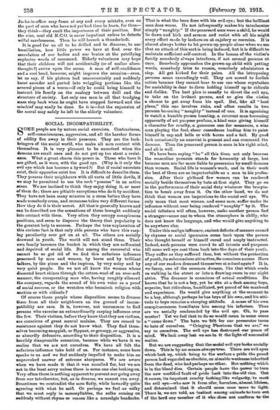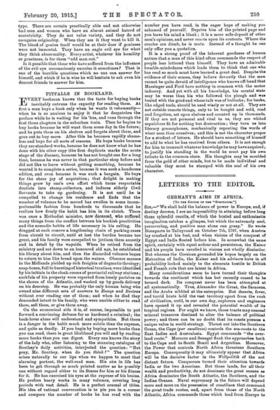SOCIAL INCOMPATIBILITY.
SOME people are by nature social exorcista. Contrariness, self-consciousness, aggression, and all the harsher forms of oddity flee away in their presence. They are the luck bringersof the social world, who make all men content with themselves. It is very pleasant to be exorcised when the demons are small ones and do not pet up too stout a resist- ance. What a great charm this power is. Those who have it are gifted, as it were, with'the good eye. (Why is it only the evil eye which has become a byword?) But if social exorcists exist, their opposites exist too. It is difficult to describe them. They possess their neighbours with all sorts of little devils, if we may be permitted to use the verb "possess" in an active sense. We are inclined to think they enjoy doing it, or most of them do; there are pitiable exceptions who do it by accident. They have not been many minutes in a room 'before they have made somebody cross, and crossness takes very different forms. Bow they do it is their secret. All that is generally known and an be described are the sensations of those brought suddenly into contact with them. Very often they occupy conspicuous positions, and seem to disprove the theory that popularity is the greatest help to success. Perhaps the true explanation of ' this curious fact is that only able persons who have this rasp- ing peculiarity ever get on at all. The others are socially drowned in youth. The world will not stand them. Their own family becomes the bucket in which they are suffocated and deprived of social life. But among the successful who cannot be so got rid of we find this nefarious influence possessed by men and women, by bores and by brilliant talkers, by the pious and the impious, by very noisy and by very quiet people. Do we not all know the woman whose diamond heart shines through the cotton-wool of an over-soft manner, the exasperating man who, having roughly silenced the company, regards the sound of his own voice as a proof of social success, or the wretches who besmirch religion with unction or with ridicule?
Of course those people whose disposition seems to divorce
them from all their neighbours on the ground of incom-j are rare. It is, however, not uncommon to find persons who exercise an extraordinarily rasping influence over the few. Their victims, before they know that they are victims, are conscious of great mental malaise. They are roused to resistance against they do not know what. They find them- selves becoming anappiels, or flippant, or grumpy, or aggressive, or absurdly defensive, according to their disposition. It ie a horribly disagreeable sensation, because while wellave it we realize that we are not ourselves. We have all felt thel gefarious influence take hold of us. For instance, Gomel:sire speaks to us and we feel -suddenly impelled to make him an unprovoked answer of extreme -sharpness, We are aware when we have made it that it was uncalled for, but we are not in the least sorry unless there is some one else looking-cm. Very oftenthere is nothing:apparent to patent-our going away from our interlocutor, but, as in dreams, we canna run away. Sometimes we contradict the man flatly, while inwardly quite agreeing with what he said. Or perhaps we feel -so sulky that we must reply in monosyllables, the sulker coming on suddenly without rhyme or reason like a neuralgic headache. Thatis What the bore does with his evil eye; but the brilliant man does worse. He not infrequently makes his interlocutor simply "naughty." If the possessed man were a child, he would lie down and kicic and scream and resist with all his might every effort made by lookers-on at cajolery or coercion. It is almost alwnye better to let grown-up people alone-when we see that an attack of this sort is being induced, -but it is difficult to maintain sufficient self-control. In the bosom of -the victim's family somebody always interferes, if not several persons at once. Somebody approaches the grown-np child with petting words, -somebody tries to reason, somebody administers it slap. All get kicked for their pains. All the interposing persons mean exceedingly well. They are moved to foolish action because they cannot-bear tones one whose reputation for amiability is dear to them bolding himself up to ridicule and dislike. The best plan is usually to divert the evil eye, to take on the irritant person, and so give the victim a chance to get away from his spelL But, like all "bud plane," this one involves risks, sand often results in two persons 'becoming " naughty" instead of one. It is agonizing to watch a humble person boasting, a reverent man -becoming apparently of set purpose profane, a kind man giving himself a charades for cruelty, a:generous one for meanness, a wise man playing the fool, sheer cussedness leading him to paint himself in cap and bells or with horns and a tail. By good luck occasionally an exorcist is present and can command the demons. Then the possessed personis soon in his sight mind, and all is well.
We have been saying "he" all this time, not only because the masculine pronoun sbands for humanity at large, but because men are far more liable to possession hysimall demons than women. Social life'is women's work, and in their work the best of them are as impertutbable as a man in his profes- sion. After their girlhood few women can be rendered socially beside themselves by bate at -first sight. They go on in the performance of their social duty whatever the tempta- tion to break away from it. On the other hand, we do not think that women are impervious to the social evil eye. We only mean that most women. and some men, suffer under its influence without ever being rendered " naughty " by it. The social Maoism will often, however, make another person feel a stranger—some one to whom the atmosphere is -chilly, who does not know the language, and who would glee-anything to be anywhere else.
Under this malign influence, aneimittlefects of manner caused by shyness or social ignorance come back upon the person who thonght-herself or himself cured and amply instructed. Indeedosuch persons were mixed to all intents end purposes till samosa-eye cast them back into the days of their youth. They suffer as they suffered then, but without the protection of youth, its subconscious attmction,its conscious excuse. Have any of our readers dreamed themselves at school again P It is, we fancy, one of the common dreams, like that which sends us walking in the street or into a drawing-room in our night attire. The dreamer is conscious -of actual -conditions. He knows that he is -not a boy, yet be sits at a Sleek among boye, superior, but ridiculous:humiliated, yet proud of hie manhood and experience. Ile would give anything at the moment to he a boy, although pentane he has boye elf his own, and his atti- tude to boys remains a-stooping attitude. A sense of his own conspicuousness humiliates him among his inferiors. Thus are we socially confounded by the evil eye. Oh, to pass mustert Yet weleel that to dose would mean in some sense
"-come-down." The hate we 'felt for our persecutes- turns to hate Of -ourselves. "Cringing 'Pharisees that-eve are," we say to ourselves. The well -eye has destroyed our -peace -of mind. Welook away telt we see in it the light a euocessfel malice.
But we are suggesting that thesocial evil eye looks socially down. This is by no means olwaysttree. There are evil eyes which look up, which bring to the *enlace a.pride -the proud person bad regarded asobsolete, an simaide weakness inherited from the-dead, who had-perhaps no other. Bus nothing which is in the•blood -dies. Certain people -have the power to turn the now modified fault of pride hack into the old vice. Out it comes, its impotent cruelty -looking like vulgarity, to meet the evil eye—who saw it from afar, -harmless, almost lifeless, and determined 'that it should ...some once more to light. There is, we are told, an instinct among unimateto turn eut of the herd any member of it who ,,does not conform to the
type. There are certain practically able and not otherwise bad men and women who have an almost animal hatred of eccentricity. They do not value variety, and they do not recognize originality. When they see it they want to kill it. The blood of genies itself would be at their door if geniuses were not immortal. They have an eagle evil eye for what they think abnormality. Every artist, whatever his humility or greatness, is for them "odd man out."
Is it possible that those who have suffered from the influence of the evil eye unconsciously exercise it sometimes P That is one of the horrible questions which no one can answer for himself, and which if he is wise he will hesitate to ask even his dearest friends to answer for him.







































 Previous page
Previous page